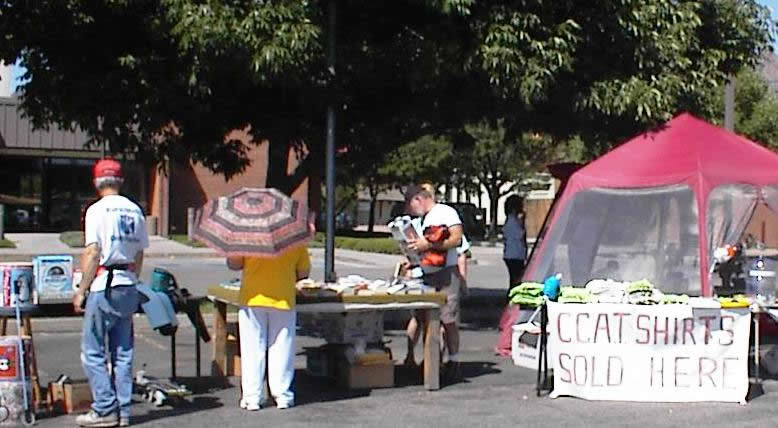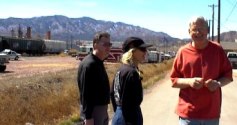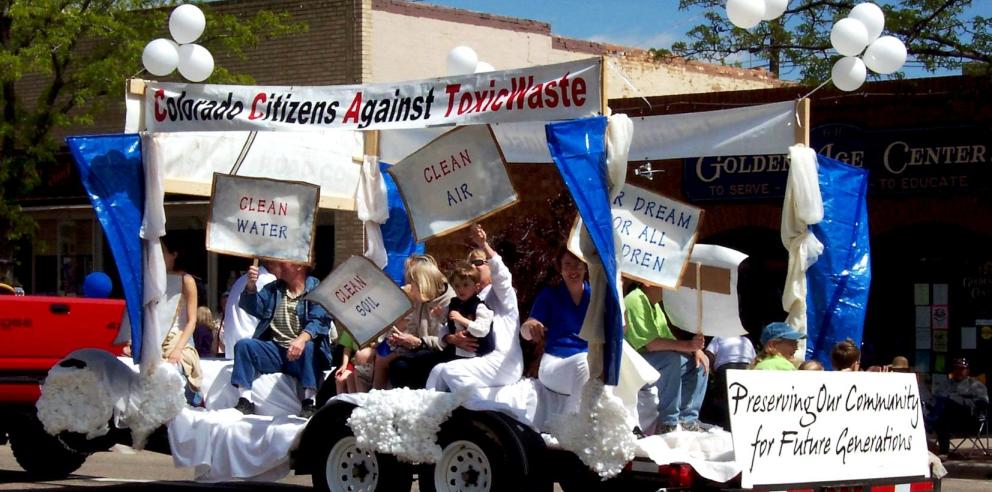CCAT History
CCAT is a grassroots non-profit organization in Fremont County, Colorado, that formed March 7, 2002, after the Cotter Corporation Uranium Mill announced plans to import 450,000 tons of radioactive/toxic waste from the Maywood Chemical Works Superfund Site in New Jersey. The Cotter Mill, built in 1958, sits uphill two miles from downtown Canon City, with approximately 8,000 residents inside a two mile radius. Our community stopped the Maywood Project, and Cotter announced closure and pursuit of license termination in Dec 2011.
Since forming, CCAT has been a diverse volunteer group of educators, business professionals, health care workers, business owners, county and state employees, retirees, homemakers, and others. We love our region and want to preserve its rare assets: Nature’s Beauty, Clean Air, and Fresh Mountain Water. Cotter’s recent closure began a new era for our community, a renewed effort to ensure “the best” cleanup of mill contamination in our water and soil.
Current law provides public involvement in decision making, and CCAT has been involved by addressing our County Commission, City Councils, and attending public meetings. Between 2002 and 2010 , we testified at legislative hearings encouraging passage of House Bills 1408, 1358 and 1348 that revised the Radiation Control Act of Colorado. Though not perfect, the bills provided additional rights to our community threatened with becoming a radioactive dump for our Nation. The revised statutes provided $50,000 for County Commissioners to hire independent experts to review industry environmental assessments, deadlines for applications involving radioactive waste and licensing renewals, public hearings, socioeconomic impact studies, and a requirement that the Colorado Department of Public Health and Environment consider these facts when making decisions about licensing.
CCAT also participated as a Party to the Cotter Maywood Hearing in 2004, and the Cotter License Renewal Hearing in 2005, calling and questioning witnesses and presenting evidence proving the socioeconomic threat to our community. The Maywood and direct disposal proposal was officially dropped in 2008.
CCAT’s goal is to educate ourselves and community about radioactive industrial operations that threaten our environment, property values, health, economy, tourism industry, and social well being. We will continue to pass this information along via the media, special meetings, newsletters, local and national events, and our websites.
|
SIGNIFICANT ACHIEVEMENTS
Colorado Housebill 1408, 1358 and 1348: In 2002, 2003, and 2010 CCAT encouraged public support for revision of the Radiation Control Act of Colorado, which increased public participation and socioeconomic impact evaluation for siting and licensing facilities handling radioactive waste, and requiring cleanup of contamination before seeking approval to process new materials.
Cotter Uranium Mill application for Maywood radioactive waste 2002: CCAT began educating the public on radioactive materials and waste, encouraging expression of opinions at public meetings, circulating petitions, and encouraging public participation at legislative hearings:
General Petition Opposing Maywood: 5,000 signatures
Business Petition Opposing Maywood: 145 signatures
Health Providers Opposing Maywood: 60+ signatures
Educators Opposing Maywood: 60+ signatures
Fremont County & Colorado Medical Societies: Signed Resolutions opposing Maywood, alternate feed, and calling for Decommissioning of the Mill.
Maywood Hearing Fall 2004: CCAT was a Party representing citizens and presented evidence of potential negative socioeconomic impact, along with Petitions opposing Maywood.
2007: CDPHE submitted Cotter’s renewed license without approval of direct disposal of waste because of the potential for negative socioeconomic impact.
2008: Cotter withdrew the Maywood application.
Cotter License Renewal Hearing Fall 2005: CCAT participated as a Party representing citizens, presented and questioned witnesses, presented evidence opposing Direct Disposal and Processing of Waste or Alternate Feed, and proof of a negative socioeconomic impact.
Public Meetings: Between 2002 and 2012, CCAT attended and encouraged public participation in over 40 public meetings concerning the Cotter Uranium Mill at the City, County, State, Superfund and Licensing level, with unprecedented public attendance.
USEPA Technical Assistance Grant: In 2003, CCAT was awarded a $50,000 grant used to hire Dr. Charles Patterson, Geologist-Geochemist-Hydrogeologist, and Dr. Arjun Makhijani, radiation expert. Both reviewed the site extensively and submitted reports with recommendations for improving investigation, monitoring and clean up in 2007.
Patterson Report - Large File 20MB - Slow Open (click here)
Makhijani Report (click here)
Community Advisory Group: In 2002, CCAT encouraged development of the CAG and attended meetings from 2005 to March 2009, when we resigned due to disagreement with the EPA and the CDPHE over denial of requested actions. After passage of Housebill 1348, and due to extensive decommissioning at the Cotter Mill, CCAT resumed participation in June 2010.
Comments Submitted on State and Federal Actions:
Old Tailings Pond Area proposed clean up;
Cotter Remedial Action Plan proposed change;
NRC Generic Environmental Impact Statement;
Agency for Toxic Substances and Disease Registry Draft Lincoln Park Public Health Assessment;
Cotter License & Waste Disposal Applications;
Black Range Mineral’s Uranium Exploration Permit;
Montrose County, CO, Permit for new uranium mill;
Pueblo County, CO, Zoning Permit for Nuclear Reactor
Others too numerous to list
CCAT v USEPA, Civil Action No. 08-cv-01787-CMA-MEH: CCAT, along with Rocky Mountain Clean Air Action, filed suit in August 2008 requesting review of radon standards (40CFR61 SubpartW) at uranium mill tailings impoundments as required by the Clean Air Act in 1990. We further requested opportunities for communities to participate in the review phase. Agreement was signed on Aug 21, 2009. See EPA website for Rulemaking Activity ongoing since 2009 (click here).
CCAT v CDPHE: Ongoing lawsuit, with the Complaint filed in Sept 2010 regarding Cotter’s low surety bond, failure to provide required public participation in the process, and a lack of revised decommissioning plans.
Ongoing Work: Watching current cleanup of the Cotter Uranium Mill and community—hired an independent scientist, Dr. Robert E. Moran, a world renowned hydrogeologist, to review and participate in cleanup plans and decisions.
|
|
 |
|
 |
|
 |
Archives |
| Under Construction |
|
|
|
 |
About Us
|
If you have questions or would like to contact us: |
|
|
Mail:
CCAT, Inc.
PO Box 964
Canon City, Colorado 81215-964
If you would like to be on our
mailing list, please send us an email by clicking here.
|
Awards
2003 RMC Sierra Club “Outstanding Community Service”
2004 USEPA National Award “Excellence in Community Involvement”
2012 Canon City Council “Certificate of Appreciation-10 Years of Dedicated Community Service”
2012 Colorado Environmental Coalition“Conservation Hero” award to CCAT’S Sharyn Cunningham |
 |
Yard Sales |
 |
Train Watching |
 |
Standing Room Only |
|
|
|
 |
All proceeds from donations go to cover expenses for legal support, independent science consultants, educational materials and programs for the public, this website, and for representing our community at Hearings as done for the Maywood waste and Cotter's License. CCAT Directors and volunteers are not paid.
Colorado Citizens Against ToxicWaste, Inc., PO Box 964,
Canon City, CO 81215-0964,
(719) 275-3432 or (719) 275-7618
|
|
|







